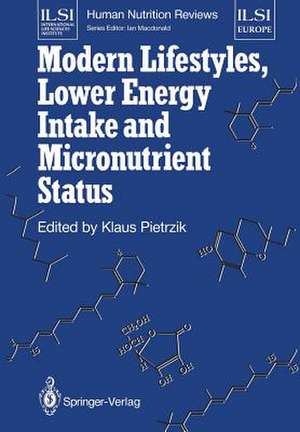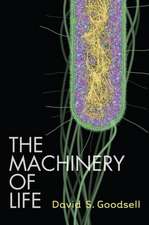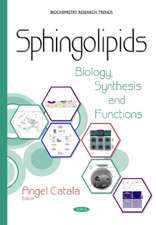Modern Lifestyles, Lower Energy Intake and Micronutrient Status: ILSI Human Nutrition Reviews
Editat de Klaus Pietrziken Limba Engleză Paperback – 9 mai 2012
Preț: 639.08 lei
Preț vechi: 751.86 lei
-15% Nou
Puncte Express: 959
Preț estimativ în valută:
122.30€ • 132.80$ • 102.73£
122.30€ • 132.80$ • 102.73£
Carte tipărită la comandă
Livrare economică 23 aprilie-07 mai
Preluare comenzi: 021 569.72.76
Specificații
ISBN-13: 9781447132721
ISBN-10: 1447132726
Pagini: 232
Ilustrații: XVI, 212 p. 16 illus.
Dimensiuni: 170 x 244 x 12 mm
Greutate: 0.38 kg
Ediția:Softcover reprint of the original 1st ed. 1991
Editura: SPRINGER LONDON
Colecția Springer
Seria ILSI Human Nutrition Reviews
Locul publicării:London, United Kingdom
ISBN-10: 1447132726
Pagini: 232
Ilustrații: XVI, 212 p. 16 illus.
Dimensiuni: 170 x 244 x 12 mm
Greutate: 0.38 kg
Ediția:Softcover reprint of the original 1st ed. 1991
Editura: SPRINGER LONDON
Colecția Springer
Seria ILSI Human Nutrition Reviews
Locul publicării:London, United Kingdom
Public țintă
ResearchCuprins
1. Effects of Lifestyle on Nutrient Requirements.- Lifestyle.- Lifestyle Components.- The Epidemiological Model.- Conclusion.- 2. Effects of Special Physiological Conditions on Micronutrient Status: Pregnancy, Lactation and Ageing.- Effect of Pregnancy and Lactation of Micronutrient Status.- Effect of Ageing on Micronutrient Status.- 3. Critical Appraisal of Current Approaches Towards Micronutrient Requirement.- The Analytical Logical Approach.- The Epidemiological Approach.- The Balance Approach.- The Pragmatic Approach.- Special Considerations.- Bioavailability.- The Concept of Relative Nutritional Density.- Summary.- 4. Identification of Those Micronutrients Most Likely To Be Insufficient as the Result of Habitual Low Energy Intake.- Materials and Methods.- Results.- Discussion.- Conclusion.- 5. Biochemical Markers for Micronutrient Status and Their Interpretation.- Vitamins.- Macroelements and Trace Elements.- Discussion.- 6. The Functional Significance of Marginal Micronutrient Deficiency.- Aetiology and Micronutrient Deficiency.- Functional Significance of Marginal Micronutrient Deficiencies.- Conclusion.- 7. The Functional Significance of Marginal Micronutrient Deficiency: Vitamin C.- 8. The Functional Significance of Marginal Micronutrient Status: Folate.- The Probability of Micronutrient Deficiency.- Sequence of Events in Folate Deficiency.- Haematological Findings in Marginal Folate Deficiency.- Biological Importance and Frequency of Marginal Folate Status.- Functional Significance of Marginal Folate Deficiency.- 9. Vitamin A Deficiencies and Latent Deficiencies.- Metabolism and Function of Vitamin A.- Diagnosis of Vitamin A Deficiency.- Vitamin A Deficiency.- Conclusion.- 10. Vitamin E: The Functional Significance of Suboptimal Plasma Levels.- Cancer.- Ischaemic Heart Disease (IHD).- Discussion of Prudent Doses.- Summary.- 11. Selenium and Modern Lifestyles.- 12. Calcium: The Functional Significance of Trends in Consumption.- Modern Trends in Calcium Intakes.- International Perspective of Calcium Intakes.- Calcium Deficiency.- Adaptation or Altered Requirements?.- Calcium RDAs and the Significance of Decreased Calcium Intakes.- 13. Magnesium: Clinical Forms of Primary Magnesium Deficiency.- The Neuromuscular Forms of MDI.- Other Clinical Forms of MDI.- Conclusion.- 14. The Functional Significance of Iron Deficiency.- The Main Iron Compounds in the Body and Their Function.- Iron Metabolism.- Effects of Iron Deficiency.- Thyroid Hormone Metabolism and Thermoregulation.- Concluding Comments.- 15. Zinc: The Functional Significance of Marginal Deficiency.- The Functions of Zinc.- Indices of Zinc Status.- Zinc in Food.- Experimental Restriction of Zinc Intake in Man.- Signs of Marginal Zinc Deficiency in Primates.- Indications of Marginal Zinc Deficiency in Man.- Adaptation to Low Zinc Intake.- Conclusions.- 16. Lowered Dietary Energy Consumption and Potential Consequences for Micronutrient Intake: An Overview.- Has There Really Been a Change in Total Food Intake?.- Are Data Devised from Food Intake Measurements of Misleading Accuracy?.- Can One Automatically Link Energy Intake to a Reduced Micronutrient Intake.- Practical Implications for the Immediate Future.- Metabolic Interactions between Nutrients.- The Diagnosis of Community Nutritional Status from Intake Data.- Conclusions.- Appendix 1: Report of the Vitamins Working Group.- Appendix 2: Report of the Minerals Working Group.



















